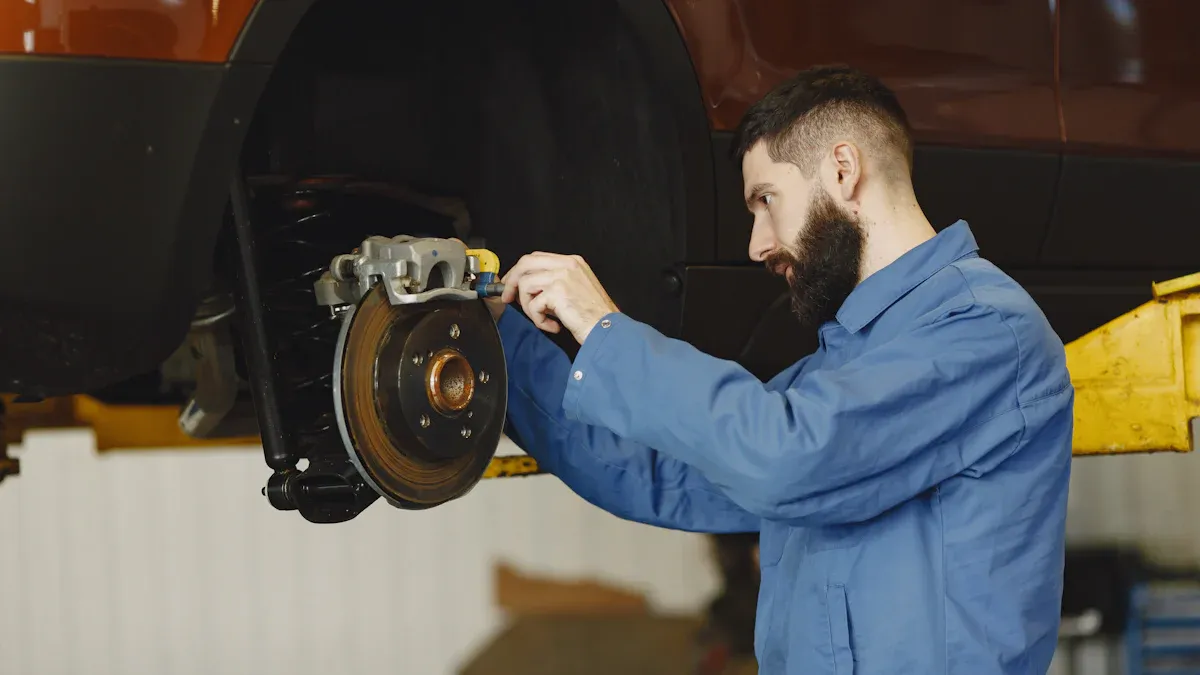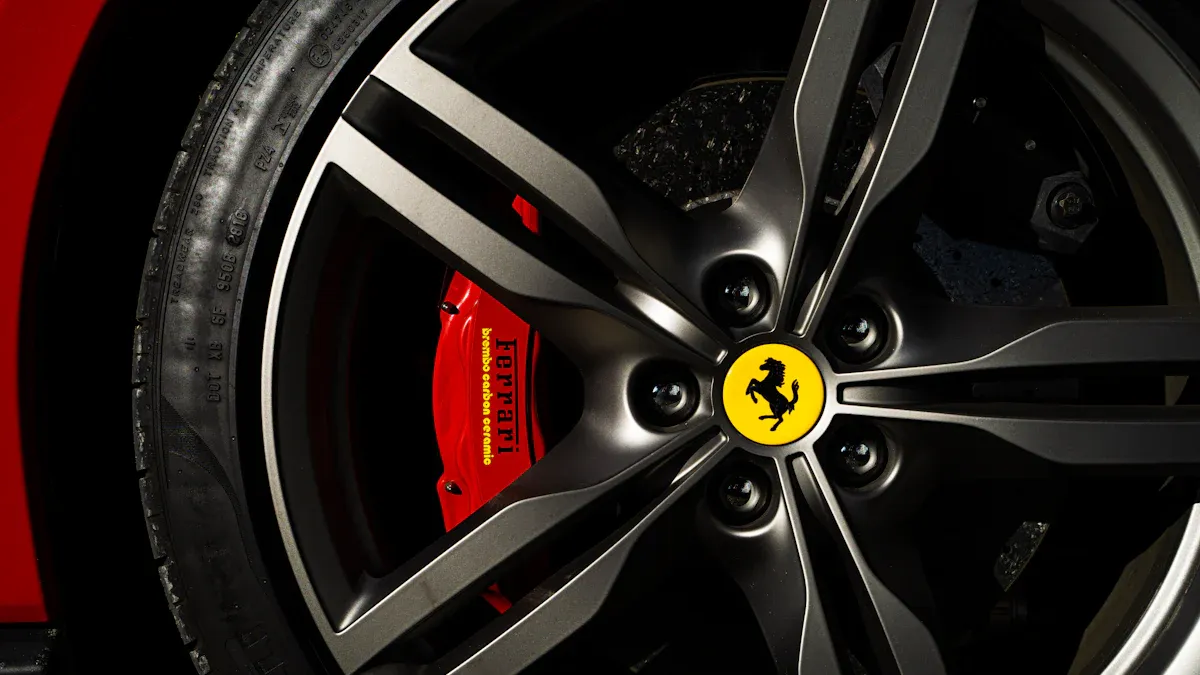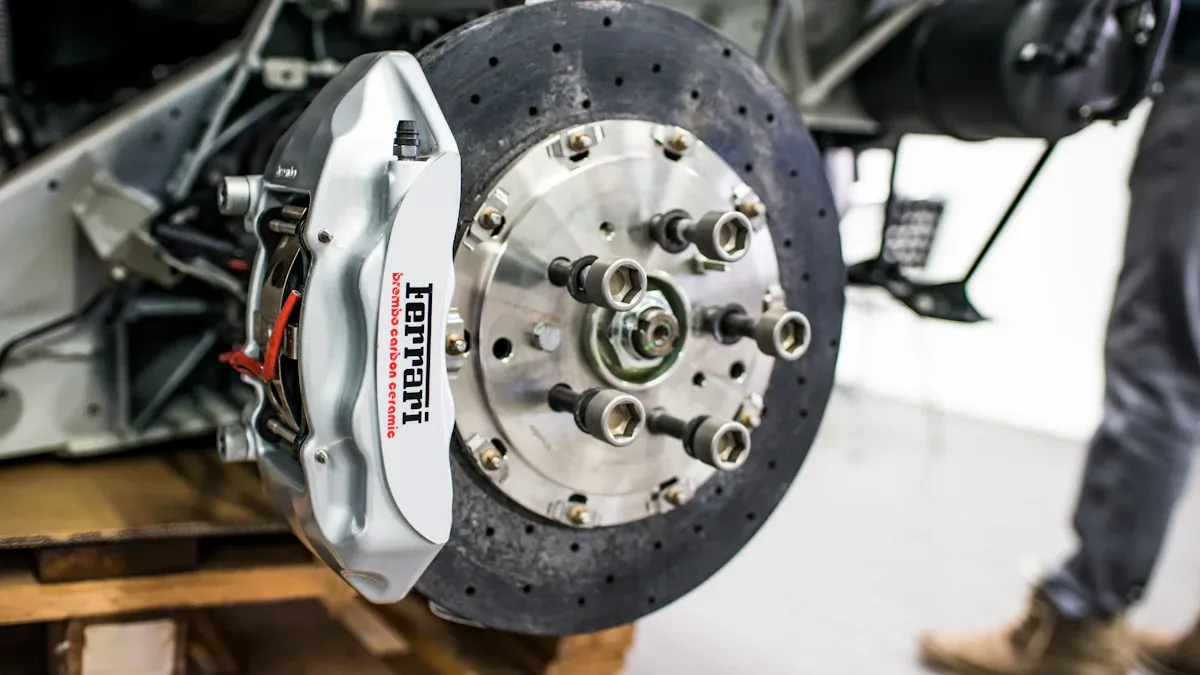
Driving with a bad brake master cylinder puts you and others at serious risk. When this part fails, your brakes may not work properly, making it harder to stop your car. Don’t ignore the signs. If you suspect an issue, get your vehicle inspected and repaired immediately to stay safe on the road.
Key Takeaways
- A faulty brake master cylinder can cause brakes to fail. This can make driving unsafe, so fix issues quickly.
- Checking and maintaining your brakes often can avoid big repairs. It also keeps your car safe to use.
- If your brake pedal feels soft or lights flash, stop driving. Get help from a mechanic to check and fix the problem.
What is a Brake Master Cylinder?

The role of the brake master cylinder in the braking system
The brake master cylinder is like the heart of your car’s braking system. When you press the brake pedal, this part gets to work. It converts the force from your foot into hydraulic pressure. This pressure pushes brake fluid through the system, which makes the brakes at each wheel engage. Without it, your brakes wouldn’t respond when you need them most.
Think of it this way: the brake master cylinder is the middleman between you and your car’s brakes. It ensures that the energy from your foot gets transferred to the brakes efficiently. Whether you’re slowing down at a stop sign or making an emergency stop, this component plays a key role in keeping you safe.
Why the brake master cylinder is essential for vehicle safety
Your safety on the road depends heavily on the brake master cylinder. If it fails, your car might not stop when you hit the brakes. That’s a scary thought, right? A properly working master cylinder ensures that your brakes respond quickly and consistently.
It also helps distribute braking power evenly to all four wheels. This balance is crucial, especially during sudden stops or slippery conditions. A faulty brake master cylinder can lead to uneven braking, which increases the risk of losing control of your vehicle.
In short, this small but mighty part is what makes your car’s braking system reliable. Keeping it in good condition is one of the best ways to ensure your safety and the safety of others on the road.
Symptoms of a Failing Brake Master Cylinder
Spongy or sinking brake pedal
Have you ever pressed your brake pedal and felt like it was too soft or spongy? That’s a red flag. A failing brake master cylinder often causes this issue. When the seals inside the cylinder wear out, they can’t maintain proper hydraulic pressure. This makes the pedal feel mushy or even sink to the floor when you press it. If this happens, don’t ignore it. Your brakes might not work when you need them most.
Brake warning light activation
Your car’s dashboard is like its way of talking to you. If the brake warning light turns on, it’s trying to tell you something’s wrong. A bad brake master cylinder is one possible cause. This light could mean the system is losing pressure or there’s a fluid issue. Either way, it’s a sign you shouldn’t overlook. Pay attention to that warning and get your car checked out.
Visible brake fluid leaks
Brake fluid is essential for your braking system to work. If you notice puddles of fluid under your car, it could mean the brake master cylinder is leaking. This fluid is usually clear or light yellow and has a slightly oily feel. Leaks not only reduce braking power but also signal that the cylinder might need replacement. Keep an eye out for these signs when inspecting your vehicle.
Reduced braking power or longer stopping distances
Does your car take longer to stop than usual? That’s another symptom of a failing brake master cylinder. When the cylinder can’t create enough hydraulic pressure, your brakes lose their effectiveness. This can make stopping your car feel like a challenge, especially in emergencies. If you notice this, it’s time to act fast and get your brakes inspected.
Risks of Driving with a Bad Brake Master Cylinder

Increased likelihood of brake failure
Driving with a bad brake master cylinder is like playing with fire. When this part starts to fail, your brakes might not work when you need them most. The master cylinder is responsible for creating the hydraulic pressure that makes your brakes function. If it can’t do its job, you’re at a much higher risk of complete brake failure. Imagine pressing the brake pedal and nothing happens—that’s a terrifying situation no one wants to face.
Higher risk of accidents and injuries
A faulty brake master cylinder doesn’t just put your car at risk; it puts you and everyone around you in danger. Without reliable brakes, stopping your car becomes unpredictable. This increases the chances of rear-ending someone or losing control in an emergency. Even a small delay in braking can lead to serious accidents. Your safety and the safety of others depend on a fully functioning braking system.
Potential damage to other braking system components
When the brake master cylinder fails, it can cause a domino effect. Other parts of your braking system, like the brake lines or calipers, may also suffer damage. Leaking brake fluid can corrode these components, leading to even more expensive repairs. Ignoring the issue only makes things worse over time.
Legal and financial consequences of driving an unsafe vehicle
Driving with a bad brake master cylinder isn’t just dangerous—it’s also illegal in many places. If you’re caught driving a car with faulty brakes, you could face fines or even lose your license. Worse, if an accident happens, you might be held liable for damages and medical bills. Fixing the problem now can save you from these costly consequences later.
What to Do If You Suspect a Bad Brake Master Cylinder
Stop driving immediately and inspect the vehicle
If you think your brake master cylinder is failing, stop driving right away. Pull over to a safe spot and turn off your car. Driving with faulty brakes is dangerous and could lead to an accident. It’s better to pause your trip than to risk your safety or someone else’s.
Tip: Always keep an eye on how your brakes feel while driving. If something feels off, don’t ignore it.
Look for signs such as fluid leaks or dashboard warnings
Once you’ve stopped, check for visible signs of trouble. Look under your car for any puddles of brake fluid. This fluid is usually clear or light yellow and feels oily. Also, check your dashboard for warning lights. If the brake warning light is on, it’s a clear sign that something’s wrong with your braking system.
Contact a professional mechanic for diagnosis and repair
Don’t try to guess what’s wrong. Call a trusted mechanic to inspect your car. They have the tools and expertise to diagnose the issue accurately. A professional can confirm if the brake master cylinder is the problem and fix it properly.
Avoid attempting DIY repairs unless you are highly experienced
Fixing a brake master cylinder isn’t a simple task. If you’re not an experienced mechanic, attempting a DIY repair could make things worse. You might even damage other parts of the braking system. Leave this job to the professionals to ensure your car is safe to drive.
Preventing Brake Master Cylinder Issues
Regularly inspect and maintain the braking system
Keeping your braking system in top shape starts with regular inspections. Check your brake pads, rotors, and fluid levels often. Look for signs of wear or damage, like squeaky brakes or uneven stopping. These small checks can help you catch problems early before they turn into costly repairs.
Tip: Make it a habit to inspect your brakes every time you get an oil change. It’s a quick way to stay ahead of potential issues.
Replace brake fluid as recommended by the manufacturer
Brake fluid doesn’t last forever. Over time, it absorbs moisture, which can reduce its effectiveness. Follow your car manufacturer’s guidelines for replacing brake fluid. Most recommend doing this every two to three years. Fresh fluid keeps your braking system working smoothly and prevents corrosion inside the master cylinder.
Why it matters: Old brake fluid can lead to poor braking performance and even damage your master cylinder.
Address minor brake issues promptly to prevent escalation
Don’t ignore small brake problems. A squeak, a soft pedal, or a warning light might seem minor, but they can signal bigger issues. Fixing these problems early can save you from expensive repairs later. Plus, it keeps your car safe to drive.
Remember: Small fixes now can prevent major headaches down the road.
Schedule routine professional inspections for your vehicle
Even if everything seems fine, a professional inspection is a smart move. Mechanics have the tools and expertise to spot hidden problems. Schedule a brake check at least once a year. This ensures your master cylinder and the entire braking system stay in great condition.
Pro Tip: Combine your brake inspection with other routine maintenance to save time and money.
Driving with a bad brake master cylinder isn’t worth the risk. It puts your safety—and others’—in jeopardy. Spotting the warning signs early can save lives and prevent expensive repairs.
Reminder: Regular maintenance and inspections keep your brakes reliable. Take action now to ensure your car stays safe and road-ready!
FAQ
What happens if I ignore a bad brake master cylinder?
Ignoring it can lead to total brake failure. This puts you at risk of accidents, costly repairs, and legal consequences.
How much does it cost to replace a brake master cylinder?
Replacement costs vary but typically range from $300 to $500, including parts and labor. Prices depend on your vehicle’s make and model.
Can I test my brake master cylinder at home?
You can check for symptoms like spongy pedals or fluid leaks. However, diagnosing it accurately requires professional tools and expertise.
Tip: Always consult a mechanic if you’re unsure about your brakes. Safety comes first!
Post time: Apr-06-2025

